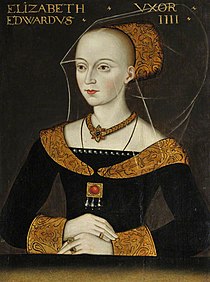As much as I enjoy historical fiction, it may come as a surprise that I've never read anything by Philippa Gregory. She's pretty much the queen of historical fiction, best known for The Other Boleyn Girl. After reading this, I think it might be safe to say it's the start of a beautiful relationship between Philippa and I.
The White Queen is the first in a series of books about the Plantagenet royals in England. At the center of this book is the War of the Roses -- the war between the Yorks and the Lancasters for the rightful heir to the throne. The Lancasters were symbolized by a red rose, the Yorks by a white rose -- hence the title The White Queen. (The next book in this series is The Red Queen, written about Lancastrian heiress Margaret Beaufort).
Elizabeth Woodville is the narrator of The White Queen, and she is a very intriguing character indeed. Elizabeth was originally from the House of Lancaster, with both her father and husband fighting in the War of the Roses against the Yorks, who had already placed Edward IV on the throne. Her husband died in battle, and Elizabeth was widowed with two young sons and a difficult set of in-laws. As historical legend has it, Elizabeth stood on the side of the road waiting for Edward IV to pass with his army so that she could ask him to settle a financial dispute between her family and her late husband's family. It is said that Edward was taken by her beauty immediately, and the two were soon married in secret. Yes, a Lancastrian widow and the York King of England. You heard me right. That is history, folks. You can't make up stories any better than what has actually occurred in this strange world of ours.
So, Philippa Gregory takes us from Elizabeth's time as a frustrated widow to her days as the most beautiful queen England ever saw, and then through several more battles for the throne. With the War of the Roses (commonly referred to as "The Cousin's War") as the backdrop, Elizabeth's story makes for a wonderful novel of conspiracy, scandal, revenge, and loss. The fact that the war really is a tangle of cousins, friends, and former allies means that you never really know what side anyone is on.
There's something wonderfully authentic about Philippa Gregory's writing. You lose all sense of the novel being fiction. It often feels like you're just reading Elizabeth's diaries. I guess if you are able to build a name for yourself as one of the best historical fiction authors of your time, you know how to do research. I was impressed that just about every major aspect of the novel is based on historical evidence. Of course she fills in some gaps from time to time and has to choose between a handful of historical theories about what may have happened, but everything from Elizabeth's stunning beauty to her family's reverence of Melusina the water goddess are based on evidence. There's a pretty impressive bibliography in the back of the book that shows just how hard she worked to ensure the accuracy of her work.
One thing I feel like I need to mention is how striking the lust for an honorable title is to these people. Elizabeth was willing to stop at nothing to make sure her son would claim the throne after Edward died. If you know your history, you know that after Edward died, his brothers tried to keep his son from the throne by claiming he was a bastard, and that Elizabeth was no more than his mistress, not his wife. It's one thing to want your family to get what is deservedly theirs, but it gets to the point where her entire family is suffering and at times facing death just for the chance that her son might get to be king. It's not even about right and wrong after a certain point -- it's just pride. It's hard to explain without laying out the entire plot of the book, but it's just such a warped sense of snobbery. I don't get it. Again, that's just the way it was, so it's not a problem with the book, it's a problem with history. It's always been confusing to me, but it is very well-displayed in this novel.
Here's a bit of a warning, though. You may or may not have noticed that the English, particularly the royal English, aren't very original when it comes to choosing names. You have to stay on your toes when you're reading this, because there are several Edwards, a few Elizabeths, some Georges, and more Richards than I care to think about. For God's sake, Elizabeth herself had two sons named Richard (one with her first husband, one with Edward). Richard was also her first husband's name, Edward's brother's name, and Edward's brother's son's name, so that's five Richards already. Throw in the Richards you come across in the names of soldiers and distant cousins, and you've basically got yourself a headache. She does a good job clarifying which one she's talking about, but still... don't read it when you're really sleepy.
Anyway, this was a very pleasant first experience with Philippa Gregory, and I am looking forward to reading her other novels.
4/5 Stars
Read from June 12, 2011 to June 24, 2011
--C


No comments:
Post a Comment